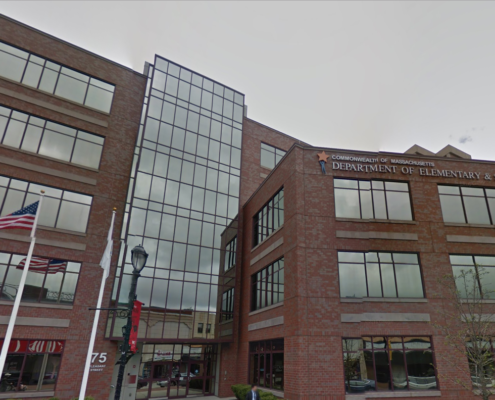
MBTAAnalysis: A look inside the MBTA
0 Comments
/
The MBTA shuttles over a million passengers a day around Greater…
 https://pioneerinstitute.org/wp-content/uploads/CloseupClock-1.jpg
739
1244
Mary Connaughton
https://pioneerinstitute.org/wp-content/uploads/logo_440x96.png
Mary Connaughton2017-02-20 12:34:192017-02-21 09:47:58The Clock is Ticking…….
https://pioneerinstitute.org/wp-content/uploads/CloseupClock-1.jpg
739
1244
Mary Connaughton
https://pioneerinstitute.org/wp-content/uploads/logo_440x96.png
Mary Connaughton2017-02-20 12:34:192017-02-21 09:47:58The Clock is Ticking…….
Imperiling the Republic: The Fate of U.S. History Instruction under Common Core
The Founders of the American experiment in democracy assumed that understanding American history was essential in a Union where publicspirited citizenship and the capacity to live under laws “wholesome and necessary for the public good” would characterize the new nation. To proceed without the knowledge of history, in their view, was a sure path to “a tragedy or a farce.”

How to Address Common Core’s Reading Standards: Licensure Tests for K-6 Teachers
The purpose of this report is to provide information to state legislators, boards of education, and departments of education on why they should adopt a stand-alone and comprehensive reading licensure test addressing Common Core’s reading standards. We do not tell states what test to adopt. Rather, we describe the features they should consider before they decide on a test that these prospective teachers should be required to pass if the state does not already require a reading test adequately addressing all of Common Core’s reading standards

Common Core’s Validation: A Weak Foundation for a Crooked House
The final version of the Common Core standards was released in June 2010. Also released at the same time was a report containing the signatures of 24 members of the Common Core Validation Committee, a committee appointed in the summer of 2009 to review the various drafts of the standards and to assure the public that the standards in mathematics and English language arts were research-based, rigorous, and internationally competitive.

The Dying of the Light: How Common Core Damages Poetry Instruction
The fate of poetry in the school curriculum may seem like an odd subject for a Pioneer Institute report. But we are struck by the absence of comments on what constitutes literary study in the schools from organizations that might be expected to have a professional interest in the school curriculum (e.g., National Council of Teachers of English, International Reading Association, Association of Supervisors and Curriculum Developers) and from higher education sources that might be expected to have a discipline-based interest in the topic (e.g., American Academy of Arts and Sciences, Modern Language Association).

Lowering the Bar: How Common Core Math Fails to Prepare High School Students for STEM
This paper began as a response to the attempt by Professor Jason Zimba, a lead writer of Common Core’s mathematics standards, to revise in 2013 what he said about the meaning of “college readiness” in 2010. Zimba’s original comments on this topic were uttered at the March 2010 meeting of the Massachusetts Board of Elementary and Secondary Education. In the official minutes of this meeting, we find the following: “Mr. Zimba said that the concept of college readiness is minimal and focuses on nonselective colleges.”

Shortchanging the Future: The Crisis of History and Civics in American Schools
The collective grasp of basic history and civics among American students is alarmingly weak. Beyond dispiriting test results on the National Assessment of Educational Progress and other measures, poor performance in history and civics portends a decay of the knowledge, skills, and dispositions needed for a lifetime of active, engaged citizenship.

Lincoln’s Legacy for Our Time: A Transcript of Remarks Delivered by Civil War Historian James McPherson
When Abraham Lincoln breathed his last at 7:22 a.m. on April 15, 1865, Secretary of War Edwin M. Stanton intoned: "Now he belongs to the ages."

The Rise and Fall of the Study of American History in Massachusetts
Across Massachusetts public schools, history teachers believe that the study of U.S. history through the grades is in jeopardy if not in a poor state altogether.1 To judge from recent national tests, students are graduating from the state’s high schools as well as from high schools across the country with little understanding of our nation’s history, its founding principles, its major institutions, and the central figures and events that shaped who we are as a people.

How Common Core’s ELA Standards Place College Readiness at Risk
Far from contradicting Common Core, these actions follow its injunction that, apart from "certain critical content for all students, including: classic myths and stories from around the world, America's Founding Documents, foundational American literature, and Shakespeare . . . the remaining crucial decisions about what content should be taught are left to state and local determination."

A Changing Bureaucracy: The History of the Massachusetts Department of Elementary and Secondary Education
The first part of this report looks closely at the background, structure, and function of the DESE in an attempt to understand how the agency has operated, how it currently operates, and what challenges, if any, the structure and operation of DESE pose for its ability to effectively exercise its increased authority. The second part recounts the recent history of the Department, especially its role in implementing the first wave of education reform, which came in the form of the 1993 Massachusetts Education Reform Act. In doing so, this work uncovers some of DESE's strengths and weaknesses in an attempt to highlight potential obstacles to successfully implementing the second wave of reform.

Controlling Education from the Top
The pressure exerted by the Department for the states to fall in line on Common Core was enormous. The Department dangled Race to the Top funding during a time of economic crisis, when forecasters were warning of impending economic cataclysm. And the Department demanded action immediately.

The Serpent in Finland’s Garden of Equity
About four decades ago, Finland introduced major reforms to grades 1-12 and teacher education, with noteworthy results. In 1970, less than 10% of its students graduated from high school. By 2010, most high school-age students attended high school and most of these students graduated.

Contracting for Performance
The results of this study show that factory model contracts are more likely to be found in the Commonwealth's lowest-performing school districts, many of which serve disproportionate numbers of poor and minority students. This policy brief concludes with six recommendations for actions that school districts can take to ensure that teacher collective bargaining contracts in the state of Massachusetts become better aligned with the professional model.

The Sacred Fire of Liberty
I want to start by thanking Jim, Jamie, and the Democrats for Education Reform (DFER) for having me today. I'm a board member at DFER, so perhaps they didn't have any choice, but I'm grateful to Pioneer for the opportunity. And on behalf of Joe Williams, greetings.

Beyond Demographic Destiny
This report analyzes achievement gaps for African-American and Hispanic minority students in selected Massachusetts school districts. It examines the gaps in English Language Arts and Mathematics achievement on the state assessment, MCAS, between each minority group and White students.

Writing Instruction in Massachusetts
This new Pioneer Institute policy brief on student writing in our schools will be helpful if it highlights the understanding that students will need to write often and at length in college and beyond.

Lowering the Bar to Get a Passing Grade
Southern New England School of Law (SNESL) is a regionally accredited law school located in North Dartmouth, Massachusetts. It was founded in 1981 and unsuccessfully sought American Bar Association (ABA) accreditation in 1997 and again in 1999.

Closing Springfield’s Achievement Gap
Business leaders, educators, policy makers, and civil rights advocates are increasingly dedicated to fundamental reform to close the achievement gap that limits hope and opportunity for students from historically disadvantaged groups. Substantial gaps in academic achievement between groups of students based on race, ethnicity and similar factors should have no place in American society in the 21st century.

Why MTEL, Not PRAXIS, Will Maintain Teacher Quality
The tests Massachusetts uses for licensing teachers, the Massachusetts Tests for Educator Licensure (MTEL), have been developed for the state by the Evaluation Systems group of Pearson (ESP) under continuously renewed contracts with the Department of Elementary and Secondary Education (DESE). Prospective teachers in Massachusetts must take a reading and writing skills test as well as a test of their subject-area knowledge.

A Step Backwards: An Analysis of the 21st Century Skills Task Force Report
The purpose of this policy brief is to help DESE set priorities for implementation of the task force's recommendations. It outlines areas where Pioneer believes the task force has crafted useful recommendations and suggests how they might be implemented. It also calls attention to recommendations that we believe are mistaken in their emphasis on skills and pedagogy over academic content, and display a lack of practicality and knowledge of both state policy and local, district-level realities.

Strengthening Standards-Based Education
The purpose of Pioneer's policy brief is to spell out the successful standards-based reforms that have made Massachusetts the highest performing K-12 state in the country, and to suggest how the BESE and the 21st Century Skills Task Force can strengthen the state's nationally recognized curriculum frameworks, student assessments, educator licensure regulations, and teacher subject area tests.

Enrollment Trends in Massachusetts
Enrollment in public schools in Massachusetts has fallen by 24,000 students, or 2.5 percent, over the past five years. The total number of students in Massachusetts public schools is now just 936,000. The decline started several years ago, and is likely to accelerate over the next decade. The drop in enrollment is steepest in Western Massachusetts and Cape Cod, and urban districts are losing students faster than suburban districts.

Differential Pay for Math and Science Teachers
Teachers are critical to attaining world-class levels of performance in mathematics and science. A growing body of research has documented a wide range in the effectiveness of individual teachers with respect to raising student achievement.

How to Strengthen K-12 Mathematics Education in Massachusetts
This position paper suggests how Massachusetts can strengthen K-12 mathematics education in its schools, drawing chiefly on the findings and recommendations presented in the final report of the National Mathematics Advisory Panel (henceforth referred to as the Panel). The Panel's report was released in March 2008 after two years of work and deliberation by seventeen researchers and scholars appointed by Secretary of Education Margaret Spellings.

Scaling Up Educational Innovation
Considering this record of low student achievement and the deep pockets of chronic under-performance, the Patrick Administration's Readiness Project and Board of Elementary and Secondary Education (BESE) are right to call for a long, hard look at the state's achievement gaps, education accountability, targeted assistance, and policymaking.

Education Reform in Massachusetts: Aligning District Curricula with State Frameworks
This study, produced by Pioneer Institute’s Center for School Reform, analyzes school district performance assessment data reported by the Massachusetts Office of Educational Quality and Accountability (EQA). This agency audits school districts regularly to evaluate their progress in implementing the reforms articulated by the Massachusetts Education Reform Act of 1993 (MERA).

Education Reform in Massachusetts: Using Student Data to Improve District Performance
This study, produced by Pioneer Institute’s Center for School Reform, analyzes school district performance assessment data reported by the Massachusetts Office of Educational Quality and Accountability (EQA). This agency regularly audits school districts to evaluate their progress in implementing the reforms articulated by the Massachusetts Education Reform Act of 1993 (MERA).

Massachusetts Collaboratives: Making the Most of Education Dollars
This paper proposes specific policy changes that could result in a more efficient, effective, and equitable system of public education in the Commonwealth of Massachusetts. Although collaboratives are local organizations focused on meeting local needs in a cost-effective manner, the state needs to take a leadership role in fostering their development and utilization.

Parents, Choice, and Some Foundations for Education Reform in Massachusetts
Drawing from a telephone survey of 1,000 public school parents in the ten largest school districts in Massachusetts, this paper critically examines public school parents’ knowledge of and interest in alternative schooling options.

Teacher Contracts in Massachusetts
This report is an initial effort to provide systematic information on teacher contracts in Massachusetts. In the summer of 1999, the Pioneer Institute solicited copies of the current contract from all districts in the state. From those that responded, 40 districts were selected to reflect the diverse makeup of the Commonwealth. Although there was no attempt to make the sample statistically representative, the three largest urban systems were included, along with a sample of suburbs and small towns.
